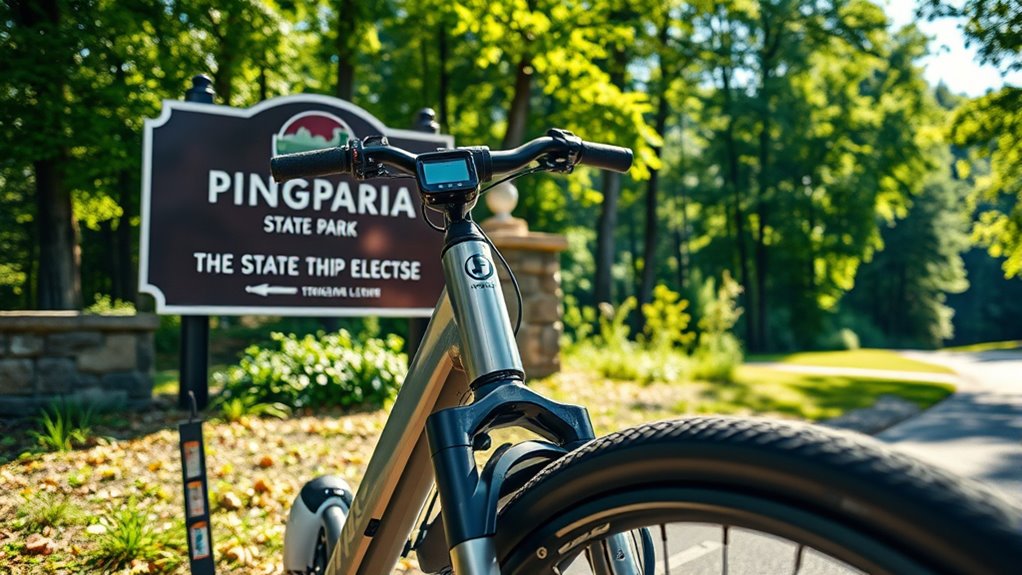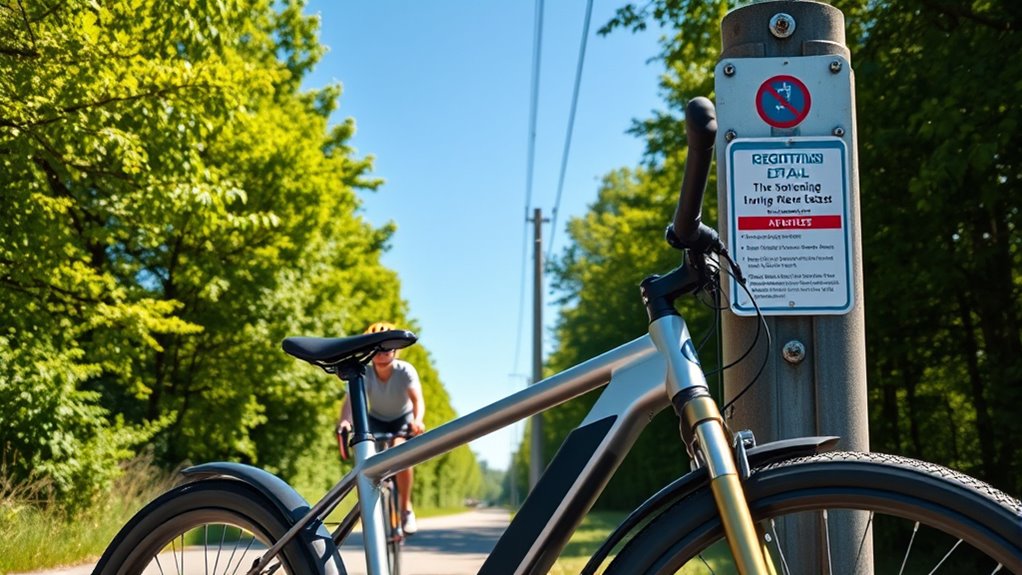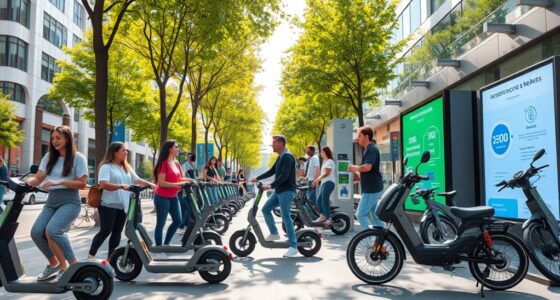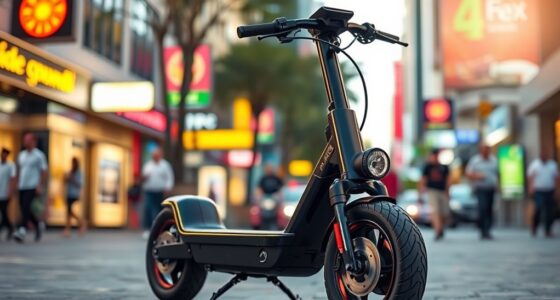In Pennsylvania, your e-bike classification determines registration and access rules. Class 1 and 2 e-bikes are treated like traditional bicycles, so you don’t need to register or register ownership, and you can ride on most bike paths and streets. Class 3 e-bikes require a driver’s license and may face restrictions on certain trails. Ensuring you follow safety and local rules keeps your ride legal and smooth—more details await if you keep exploring.
Key Takeaways
- Most e-bikes, including Class 1 and 2, do not require registration or title in Pennsylvania.
- Class 3 e-bikes require a valid driver’s license but still do not need registration.
- E-bikes are permitted on bike paths, trails, and streets, with local restrictions varying.
- Riders must adhere to traffic laws and local regulations for safe and legal riding.
- Proper classification ensures e-bikes are used in designated areas without registration requirements.

If you’re riding an e-bike in Pennsylvania, it’s important to understand the state’s specific laws to stay legal and safe. Knowing the legal requirements helps you avoid fines and guarantees you prioritize bike safety while enjoying your rides. Pennsylvania classifies e-bikes into three categories based on motor power and speed: Class 1, Class 2, and Class 3. Class 1 and Class 2 e-bikes are considered bicycles, meaning they don’t require registration or a license, but Class 3 bikes, which can reach higher speeds, are subject to more rules. Understanding these distinctions helps you comply with the law and ride confidently.
Understanding Pennsylvania e-bike laws helps you ride safely and stay compliant with local regulations.
In Pennsylvania, most e-bikes are treated like traditional bicycles, meaning you don’t need to register them or obtain a special license. However, you should always carry a valid driver’s license if you’re riding a Class 3 e-bike, since they are regulated more strictly. The state emphasizes bike safety, so wearing a helmet is strongly recommended, especially for riders under 21 or on Class 3 bikes. Being aware of the legal requirements guarantees you stay compliant while also protecting yourself in case of an accident. Additionally, understanding electric bicycle classifications helps ensure you ride within the legal limits and avoid penalties.
The law allows e-bikes to be used on bike paths, trails, and streets, but it’s essential to verify local rules beforehand. Some parks or municipalities might have restrictions on e-bike access, especially for Class 3 bikes, so researching the specific area helps prevent violations. Since e-bikes are considered bicycles, you don’t need to register them with the state or get a title, which simplifies ownership and use. Nevertheless, keeping your e-bike in good condition and understanding how to operate it safely is vital for your bike safety and legal compliance.
As a rider, you’re responsible for knowing and following the rules that apply to your e-bike class. For Class 1 and 2 bikes, you can generally ride on bike lanes, paths, and streets, just like traditional bikes. For Class 3 bikes, some restrictions may apply, such as limits on riding on certain trails or bike paths. Staying informed about these rules helps you avoid legal issues and keeps your focus on bike safety. Always wear appropriate safety gear, obey traffic signals, and follow street laws to ensure a safe and lawful riding experience.
Frequently Asked Questions
Are E-Bikes Allowed on Pennsylvania Mountain Biking Trails?
Yes, you can generally ride e-bikes on Pennsylvania mountain biking trails, but trail access depends on specific trail restrictions. Some trails permit e-bikes, especially Class 1 models, while others restrict motorized vehicles to protect terrain and ensure rider safety. Always verify trail rules beforehand, as restrictions vary by location. Respect signage and local regulations to enjoy your ride without issue and help preserve trail conditions for everyone.
Do E-Bike Laws Differ Between Various Pennsylvania Counties?
Yes, e-bike laws can differ between Pennsylvania counties due to local ordinances and county regulations. You need to check each county’s specific rules because some areas may have restrictions on e-bike usage on certain trails or roads. These local laws can vary, so it’s essential to research the regulations in the county you plan to ride in to stay compliant and avoid fines or penalties.
Can Visitors From Other States Ride E-Bikes in Pennsylvania?
You can ride your e-bike in Pennsylvania as a visitor, but make sure you’re aware of local rules. While e-bike insurance isn’t mandatory, it’s smart for protection. Check charging station locations beforehand to keep your ride smooth. Laws may vary slightly by county, so stay informed. Ultimately, follow posted signage and ride responsibly, ensuring a fun, safe experience exploring Pennsylvania’s scenic routes.
What Safety Equipment Is Mandatory When Riding an E-Bike in PA?
When riding an e-bike in Pennsylvania, you must wear a helmet if you’re under 21, but it’s strongly recommended for everyone. You should also wear reflective gear or have reflective materials on your bike to increase visibility, especially at night. While not all safety equipment is mandatory for adults, using a helmet and reflective gear helps protect you and makes you more visible to others on the road.
Are There Age Restrictions for E-Bike Riders in Pennsylvania?
In Pennsylvania, rider age limits for e-bike licensing differ depending on the e-bike type. You must be at least 16 years old to ride a Class 3 e-bike, which requires registration and licensing. For Class 1 and 2 e-bikes, there are no strict age restrictions, but minors should always have adult supervision. Always check local regulations to confirm compliance with rider age limits and licensing requirements before hitting the road.
Conclusion
Understanding Pennsylvania’s e-bike laws means you can enjoy the freedom of the open road while staying within legal bounds. It’s about balancing access with responsibility—embracing the thrill of riding without risking fines or penalties. As laws evolve, your awareness preserves your rides safe and legal. So, while e-biking offers exciting adventure, respecting the rules ensures you’ll always have open roads ahead, blending freedom and safety in perfect harmony.








